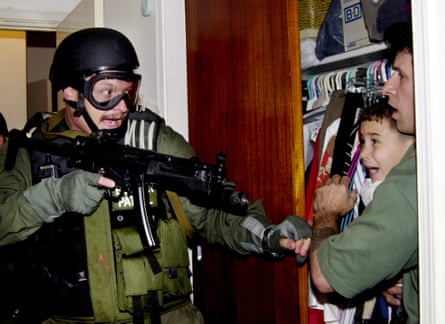 [ad_1]
[ad_1]
When he was six, his terrified face – photographed throughout a raid by armed immigration officers on his household’s Miami residence – grew to become one of the crucial memorable photos of chilly battle tensions between the US and Cuba.
Now 29, and greater than twenty years after he was forcibly deported from Florida to his homeland on the path of the US supreme court docket, Elián González is poised to develop into considered one of Cuba’s most senior lawmakers.
His nomination for a seat within the 470-member nationwide meeting, introduced within the Caribbean island’s authorities newspaper Granma on Tuesday, is seen as a excessive honor at a younger age for González, who has lengthy been crucial of US coverage in the direction of Cuba.
Hailed by the outlet as “representing probably the most worthy of the Cuban youth”, González will be part of the members who meet a number of occasions a yr to debate and set legal guidelines for the island’s communist regime.
The months-long custody battle over González started in 1999, when he survived the sinking of a ship bringing Cuban refugees to Florida. His mom died, and the kid was sorted by family, together with his nice uncle Lazaro, at their home in Miami’s Little Havana neighborhood.
The tug-of-war between the boy’s father – nonetheless in Cuba – and his family in Florida for custody quickly developed right into a full-scale diplomatic faceoff, with the communist dictator Fidel Castro bombastically threatening to dispatch guerilla squads to grab Elián again.

The tense state of affairs created a headache for the Invoice Clinton White Home. Clinton’s legal professional basic, Janet Reno, grew to become a pariah amongst Miami’s influential Cuban expat neighborhood for siding with the daddy and ordering the early morning seizure of the boy at gunpoint. His indignant family mentioned Reno had tricked them by ordering the military-style raid whereas they believed they had been negotiating a voluntary handover.
González was handled like a hero on his return to Havana, and he was used continuously as a prop by the Castro regime because it sought to capitalize on the episode.
Castro himself attended González’s seventh party. And for years his household in Cuba was surrounded by authorities bodyguards.
As he grew older, González made it clear that he welcomed Castro’s embrace, becoming a member of the Younger Communist Union of Cuba and getting into army service at 15. He rejected claims by his Miami family that he had been brainwashed.
In a 2017 interview with CNN, the yr after he graduated from a army academy with an industrial engineering diploma, González mentioned that if he had been made to remain in Miami he would have been “used” by the expat inhabitants there.
“I believe I'd have develop into the poster boy for that group of Cubans in Miami that tries to destroy the revolution, that attempt to make Cuba look unhealthy,” he mentioned.
“Fidel put many issues in my arms. Fidel instructed me if I needed to be an athlete, he supported that; if I needed to be a swimmer, he supported that. If I needed to be an artist, he supported that – and he did.”
In Miami, the home from which González was seized grew to become one thing of a shrine, remaining because it was on the day of the raid there in April 2000 and operated as a museum for a number of years by one other of his great-uncles, Delfin González, who died in 2016.
[ad_2]
Supply hyperlink https://classifiedsmarketing.com/?p=37122&feed_id=134494


